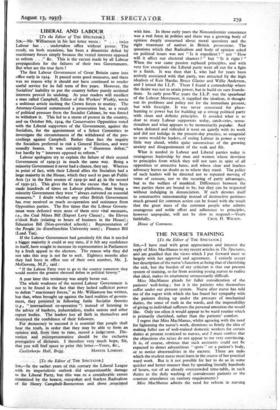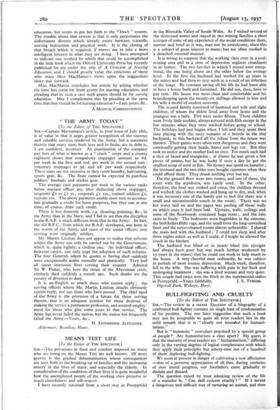THE NURSE'S TRAINING
[To the Editor of THE SPECTATOR.] SIR,—I have read with great appreciation and interest the reply of Miss MacManus to my recent articles in The Spectator, and am gratified that the views which I put forward meet so largely with her approval and agreement. I entirely accept her description of the nurse's function as being that of cherishing the sick, but the burden of my criticism is that our present system of training, so far from assisting young nurses to realise that ideal, makes its attainment unnecessarily difficult.
Miss MacManus pleads for fuller consideration of the patients' well-being ; but it is the patients who themselves suffer under our present system. Nurse after nurse has told me of the regret with which she has found her sympathy with the patients drying up under the pressure of mechanical duties, the sense of rush in the wards, and the impossibility of giving to individual sufferers the personal attention she would like. Only too often it would appear to be ward routine which is primarily cherished, rather than the patients' comfort.
I regret that Miss MacManus, whilst agreeing with the need for lightening the nurse's work, dismisses so firmly the idea of making fuller use of well-trained domestic workers for certain duties at present_ restricted to nurses, and I must confess that the objections she raises do not appear to me very convincing. It is, of course, obvious that such assistants could not be expected to detect adventitious " spots " on a patient's body, or to notice abnormalities in the excreta. These are tasks which the student nurse must learn in the course of her practical ward work. But is it not possible for her to do so in some quicker and better manner than by spending literally hundreds of hours, out of an already overcrowded time-table, in such duties as the daily washing of convalescent patients or the constant attendance, on sanitary requirements ?
Miss MacManus admits the need for reform in nursing education, but seems to pin her faith to the " block " system. The trouble about that system is that it only perpetuates the unfortunate divorce which already exists between scientific nursing instruction and practic.al work. It is the dosing of that breach which is required, if nurses are to take a more intelligent interest in what they are doing. I have attempted to indicate one method by which that could be accomplished in the little book which the Oxford University Press has recently published for me under the title of A Criticism of Nursing Education, and I should greatly value the criticisms of those who share Miss MacManus's views upon the suggestions there put forward.
Miss MacManus concludes her article by asking whether the time has come for State grants for nursing education, and pleading that in such a case such grants should be for nursing education. May I complement this by pleading at the same time that they should be for nursing education ?—I am, yours, &c., A MEDICAL CORRESPONDENT.







































 Previous page
Previous page